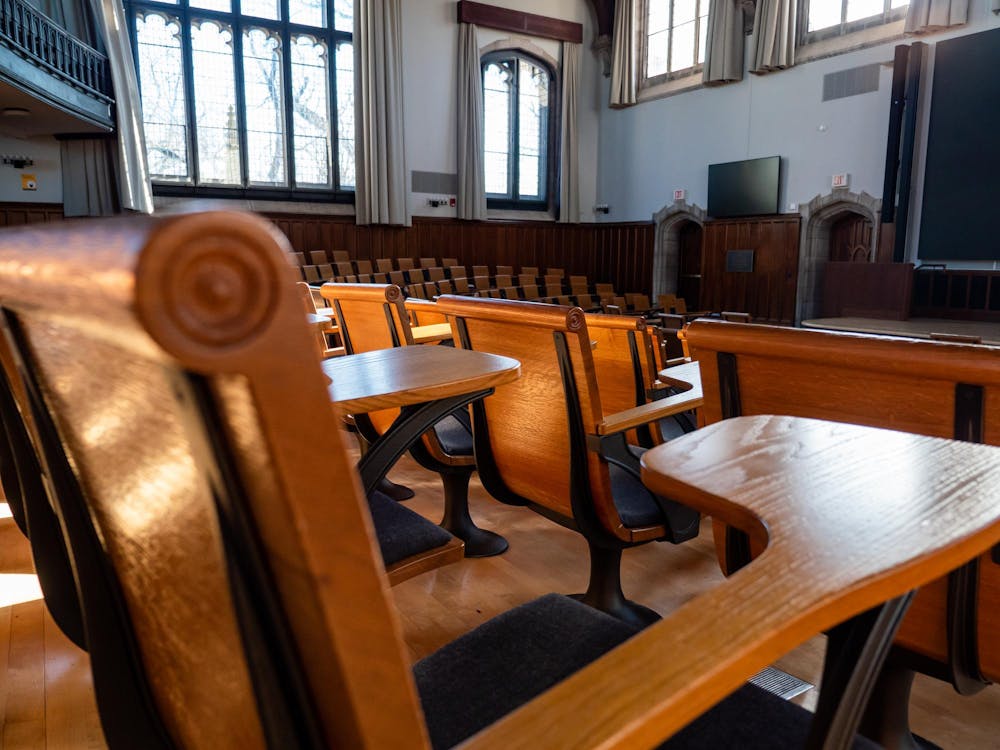The University released the course offerings for Spring 2026 on Thursday, Oct. 30, including 208 new undergraduate courses.
Many of the new course offerings seek to address current events and ongoing global issues from an academic perspective, including three addressing fascism in various contexts. AAS 400: Fascism and Black Political Thought, for instance, focuses on the ways that Black intellectuals have been able to analyze and confront fascism globally.
In comparison, ENG 305: Contemporary Literary Theory: Fascism looks into the ways fascism can adapt or reappear in the modern day. SLA 371: Modernity and Totalitarianism: Art, Cinema and Literature under Italian Fascism and Soviet Communism focuses on the parallels between cinema, art, and literature under fascism in Italy and communism in the former Soviet Union.
“I appreciate how the Economics department has updated [its] course list to reflect what’s going on in the news,” Emma Mirrer ’26 said. She pointed out the new class ECO 350: Flows and Friction: International Trade and Investment with Lecturer Silvia Weyerbrock. The course will investigate the logic and repercussions of international trade, beginning with foundational questions and moving towards contemporary challenges.
At a time when the University has not announced a comprehensive policy on the use of AI, professors have to decide for themselves what approach to take. SOC 317: The Sociology of Artificial Intelligence with Professor Zeynep Tufekci will examine a multitude of perspectives on the rise of technology like generative AI through historical and sociological lenses. The course offers optional learning opportunities outside of class time during the first two weeks of the semester for students unfamiliar with generative AI. Tufecki is also a New York Times columnist; this is the first course she’s taught at Princeton since joining the faculty in the summer of 2023.
The English department is offering 19 new courses next spring, the largest increase of any department and a sharp increase from its five new course offerings in Fall 2025. While nine are listed as ENG only, many are cross-listed with other disciplines like American Studies or Comparative Literature. These new classes also address pressing issues, with courses addressing climate change and environmental media.
Many well-known courses will also be returning to the offerings list, as students vie for coveted spots in iconic Princeton classes, particularly those that travel.
The number of courses with international travel varies by year, but EEB 338/LAS 351: Tropical Biology is consistently one of them. A three-week field course based in lowland rainforest in Panama, the class involves travel to three different field sites and subsequent independent, field-based research projects. Lecturer Andrew Gersick will teach the class for the third year in a row after receiving stellar 5.00 and 4.89 ratings. The class is only open to juniors, and requires departmental permission as well as an application or interview.

Professor James Raymond Vreeland’s POL 396: International Organizations is also consistently popular. With 4.81 out of 5 rating, the course discusses the origins and effectiveness of many different global organizations. Last spring, the class had 400 spots; this year, the cap is only 250, which may make getting a spot all the more competitive.
Vreeland noted in an email to The Daily Princetonian that the reason for the limit is due to a finite number of Politics graduate students who can run precepts for the class, as many of the current Politics graduate students have already precepted for the course.
“It’s important for their development as scholars that they have the opportunity to precept for different courses,” Vreeland wrote.
SPI 494: Making an Exoneree is also returning this spring, taught by Visiting Lecturers Chelsey Amelkin and Yosha Gunasekera. With a 4.71 rating and multiple reviews calling it “the most meaningful” course at Princeton, the application-based class asks students to spend the semester investigating potential cases of wrongful conviction and then creating several visual components, such as a documentary, website, and social media campaign, to tell the story of the individual.

Regardless of whether the course is new or returning, students often try to keep track of the courses they want to take at some point during their Princeton careers.
Skylor Wong ’26 described having created a course wishlist of classes that she would save for another semester if they did not fit into her current schedule. “A really exciting part about being a Princeton student is classes that you can only take at Princeton or that Princeton is known for,” Wong says.
“Since it’s my last time picking classes as a senior, I was really excited to pick. I’m only going to do two in the spring, because I did four [this fall],” Wong said.
Though classroom assignments have not been released, several courses will likely take place in the newly renovated art museum in the center of campus. Similarly, many engineering classes will likely make use of the newly opened Briger Hall and Commons.
Spring 2026 will be the second semester of the University’s changed schedule, allowing for 15 minutes of passing time between classes. It will also be the first full semester with Stellic, the University’s new tool for degree planning. Already in use by peer universities, the program offers streamlined progress tracking and course scheduling.
Spring term course selection will begin for seniors on Tuesday, Dec. 2, followed successively by juniors, sophomores, and first-years at 7:30 a.m. each day afterwards.
Emily Murphy is a News contributor for the ‘Prince.’ She is from New York, N.Y., and can be reached at emily.murphy[at]princeton.edu.
Please send any corrections to corrections[at]dailyprincetonian.com








